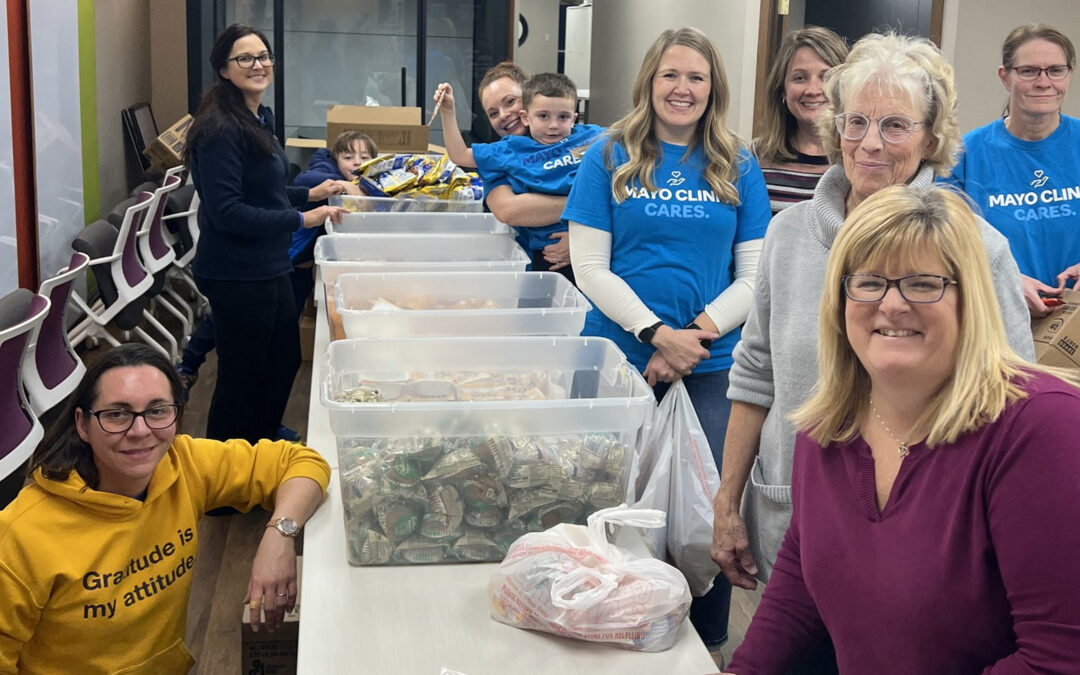By Mary Ladd
A food lifeline for kids in Minnesota’s Mower County
Mackenzie Andrews, a recent high school graduate from Austin, Minnesota, first heard about the Mower County Backpack Program from her mom, a longtime volunteer. The powerful initiative quickly captured Mackenzie’s interest as she followed in her mother’s footsteps. “It gives you a sense of purpose. You learn new skills, meet new people, and help the community, together,” she explains.
The United Way of Mower County, which spearheads the Backpack Program, is a key member of the Hometown Food Security Coalition, a group of local organizations dedicated to eradicating food insecurity in the county. At present, an estimated 3,400 children there are at risk for food insecurity.
Food bags make me feel great because we have food in the house.
Each week, a network of volunteers gathers food purchased through donations from local individuals and businesses, packs them into “backpacks” (more heavy duty grocery bag than backpack) and distributes them across five school districts so children receive nutritious, kid-friendly food to supplement their weekend meals.
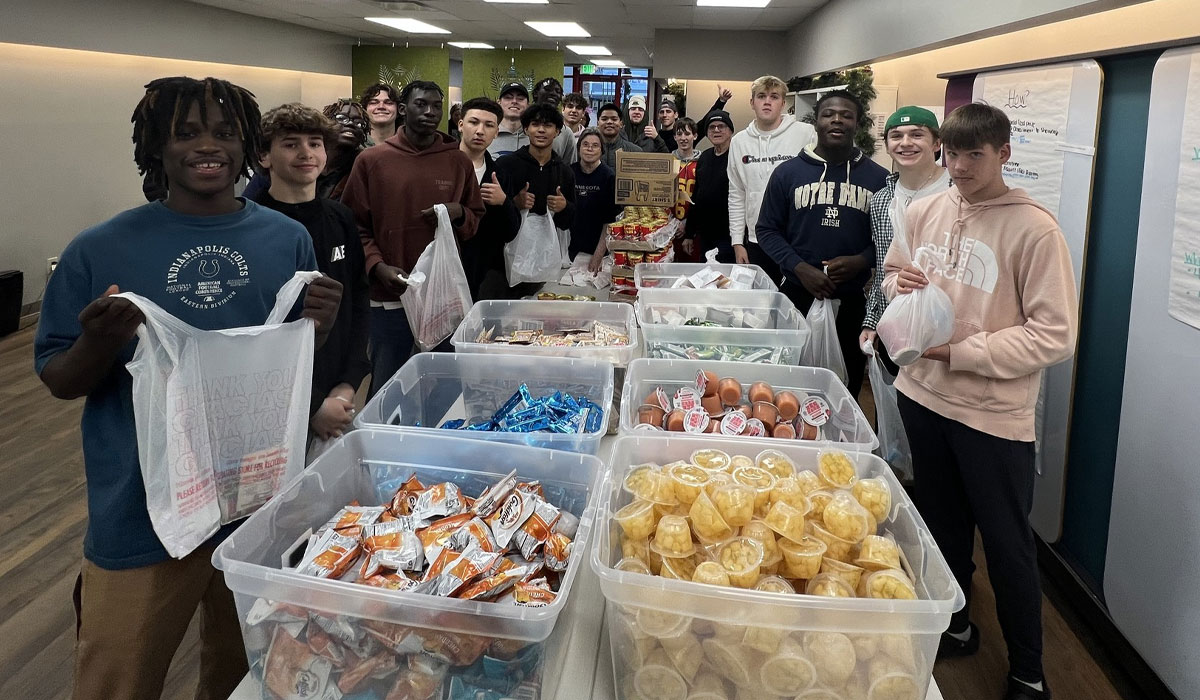
Students get together in the Hometown Food Security Project office in downtown Austin to put together backpacks for children in their community.
For many, these backpacks are more than just a source of nourishment — they are a beacon of hope. Volunteers like Mackenzie often include simple handmade affirmation cards with short messages like “You are amazing” and cheerful drawings like bright suns or beautiful rainbows. These symbols convey support, which makes the cards accessible for early readers, ensuring every child can understand and feel cared for.
While some high schoolers volunteer to fulfill community service hours for college scholarships, the feel-good factor plays a significant role, too. Brent Hernandez, another 2024 graduate, has a younger brother named Gerardo, who needs special support. Brent’s personal history inspired him to get involved. “When I was little, my parents and I struggled, and these volunteers delivered food and clothes, which helped us,” Brent recalls. Volunteering throughout high school allowed him to give back to the community that once supported his family. “It feels incredible to help others,” he adds.
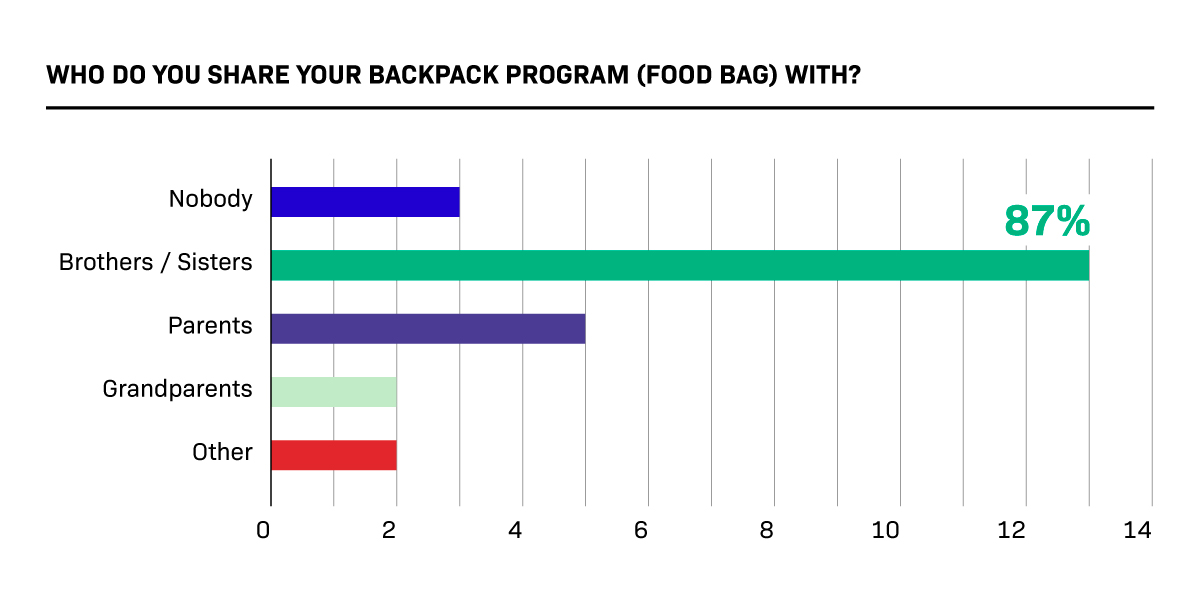
Children facing hunger are at higher risk for developmental, behavioral and health issues. Recent reports show over 13 million children in the U.S. live with food insecurity. In Minnesota alone, 183,480 children face this challenge. Mower County’s Backpack Program, which started in 2013, addresses a critical need by discreetly providing food to needy students.
School Meals: Vital Nutrition During the Academic Year
Schools nationwide provide breakfast and lunch during the academic year, thanks partly to the 2010 Community Eligibility Provision, which made it easier to offer free meals. Nutrition begins at home, however, and the Backpack Program fills the gap during weekends. In all, the program distributes 850 backpacks each week to students who qualify for free or reduced-price meals, up from 600 since the coalition augmented support.
Traditionally, hurdles to getting participants for nutrition programs like this include the bureaucracy requiring signed paperwork from a parent or guardian. Also, kids getting a free lunch used to face potential embarrassment since they’d line up in a separate cafeteria line, often receiving visibly different meals. The stigma significantly lowered during the COVID-19 pandemic, as the federal government allowed every public school student to eat free of charge. Minnesota’s 2023 legislation guaranteed free universal breakfast and lunch, with local advocacy efforts led by Mary Weikum, community advocate and the former director of food and nutritional services for Austin Public Schools.
Building Stronger Communities Through Volunteerism
The first step toward lending a hand happens when high school students, senior citizens, disabled adults, company employees (including from Hormel Foods) and other groups sign up with a platform called Get Connected, run by United Way’s Community Impact Coordinator Karem Salas Ramirez. Once signed up, volunteers can review assignments based on various options for engaging. Maryann Craig worked for years as an aide to her husband, Charlie Craig, on his school bus routes. Today, they are longtime volunteers who find joy and fulfillment due to their regular participation. “We started volunteering to stay connected. Now, we look forward to it every week,” Maryann says. “They appreciate us and always say, ‘Thank God for you guys,’” Charlie adds.
Students really love getting their food bag. The look in their eyes when they know they will have something to eat over the weekend is great.
A team of Hormel Foods volunteers delivers the monthly protein supply donated by the company, freeing Backpack Program coordinator Velerie Faulhaber to pick up snacks, crackers and breakfast cereals at Austin High School every Monday morning. Teens provide the muscle to move the food and supplies up and down steep basement stairs. Next, the volunteers meet at the Hometown Food Security Office on Main Street, forming an assembly line to fill the backpacks. Volunteers form lasting bonds through acts of kindness, promoting empathy. As Faulhaber notes, “There’s a lot of community participation that makes it work.”
Lynn Egner, VP of retail sales at Hormel Foods has been a dedicated supporter of the backpack program since moving to Austin over 10 years ago. “When my husband, a teacher, saw firsthand the need for help in our community, I knew I had to get involved,” she said. “We know from having our own children that when kids are hungry, they do not behave or focus well.” Together with a team of ten women from Hormel Foods, they lead annual fundraising events to support the program. As the need in Mower County grows, Lynn remains committed to ensuring no child in their community goes hungry. “It’s an amazing experience to help children thrive in our community.”
Distribution and Participation: An All-hands Effort
These weekly sessions also foster intergenerational friendships. Volunteers of all ages work together, sharing their experiences and learning from one another. This collaboration strengthens bonds and promotes mutual understanding and respect. Faulhaber carefully tracks how many bags need to go to each school, and Charlie Craig specializes in having a batch of bags ready each week while Maryann Craig fills the bins. The finished backpacks go into large bins stacked against a wall. At the end of one shift, Mackenzie Andrews looked at the transformed space and realized, “It was cool to see that we did that together.”
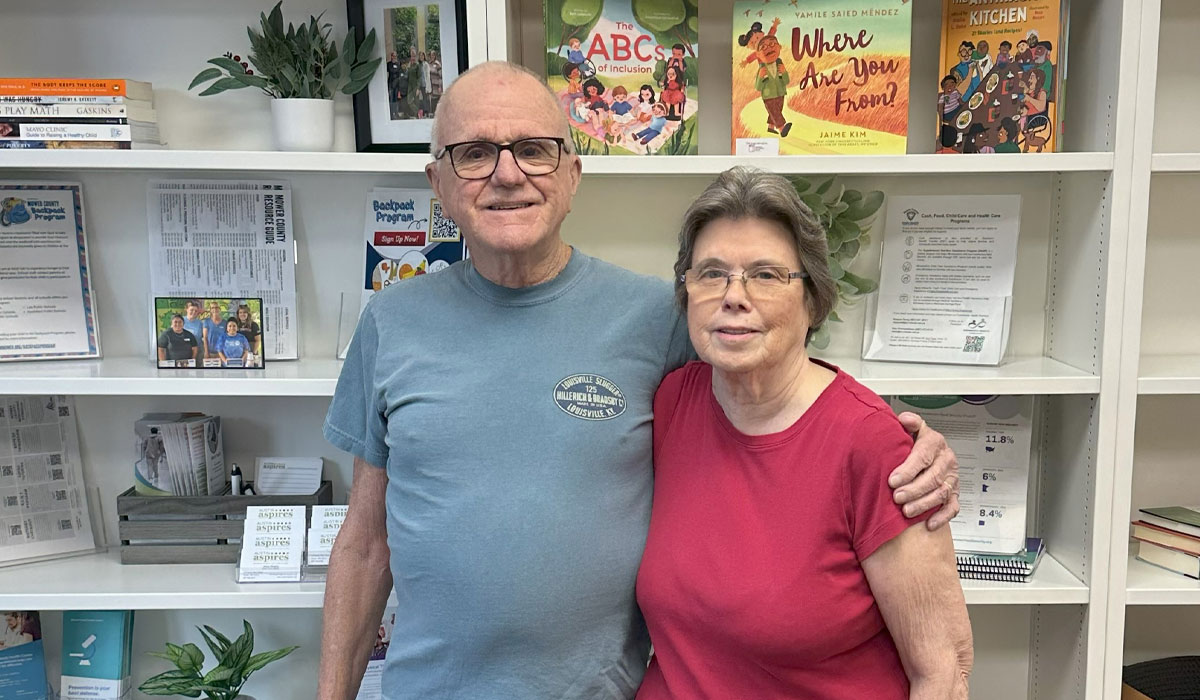
Charlie and Maryann Craig in the Hometown Food Security Project office in downtown Austin
Each shift ends when the bags are loaded into cars and delivered to the schools by volunteers. On Thursday and Friday, the school staff share the bags with the students to take home.
Behind this seemingly simple act of distribution lies a complex web of coordination, fueled by passion and care. Success coaches, who provide both social-emotional and academic support to students every day, along with Austin Aspires, teachers, and the dedicated janitorial team form the logistical backbone essential for sharing information and ensuring that backpacks reach the students who need them.
Inside the Backpacks? Nourishment and Hope
Inside each backpack, students find a variety of food items: fruit servings, snacks, breakfast bars, cereal bowls and protein. The rotating selection includes tortillas, SPAM® brand products chili, and mac and cheese cups. Kathy Huffman, a volunteer whose husband Dennis is a school bus driver, shares that Dennis often witnesses excitement as the kids dig in for their “backpack reveal.”
The Joy of Giving Back
“Dennis sometimes sees the kids’ excitement on the bus when they look to see what they have inside,“ Kathy says. They have a daughter named Susan, who has Down Syndrome. Kathy says she is their biggest reason for wanting to give back since they’ve received so much help throughout Susan’s life. Susan regularly volunteers via the People First Aktion Club, a United Way partner advocacy organization. When Susan, her friends and a supervisor work together, they may giggle when they see perennial favorites. “As they fill the bags, they say, ‘Oh, it’s Cheerios this week.’ Or, ‘Oh, it’s applesauce.’” These People First volunteers ask Faulhaber, “When can we volunteer again?”
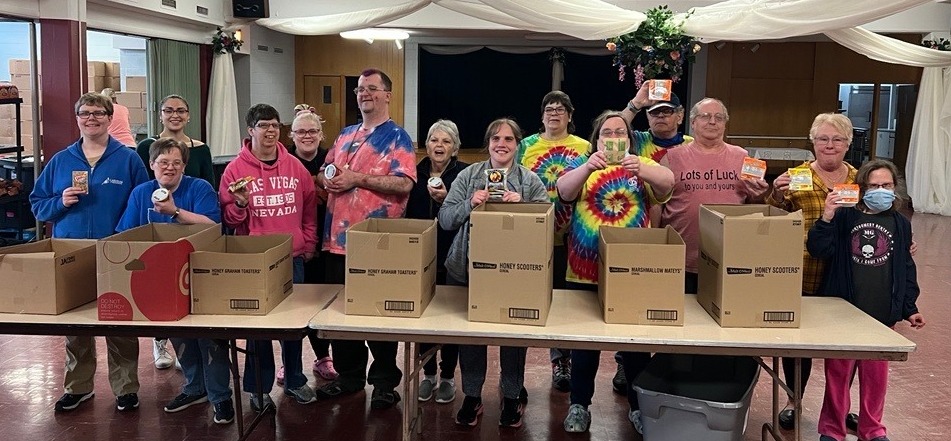
The People First Aktion Club, a United Way partner advocacy organization meet up to put backpacks together for children in their community.
Faulhaber continually seeks feedback from recipients and teachers to improve the weekly selection of items. This ongoing dialogue helps align the food with the preferences of the kids, making the program more effective. Efforts are underway to keep increasing the number of backpacks, ensuring more kids receive weekly essentials. “We have a strong foundation,” Faulhaber says. “With continued support, we can help even more children and families.”
Volunteering for the Backpack Program offers numerous emotional and social benefits. The social interaction helps combat isolation, particularly for retirees. “It’s a great way to stay connected,” Maryann says.
The Backpack Program is a shining example of what a community can achieve when it unites for a common purpose. Through the dedication of volunteers, the generosity of donors, and local business support, the program provides essential nourishment and optimism to needy children. Sincere gestures like the handmade affirmation cards create lasting impacts beyond just giving food.
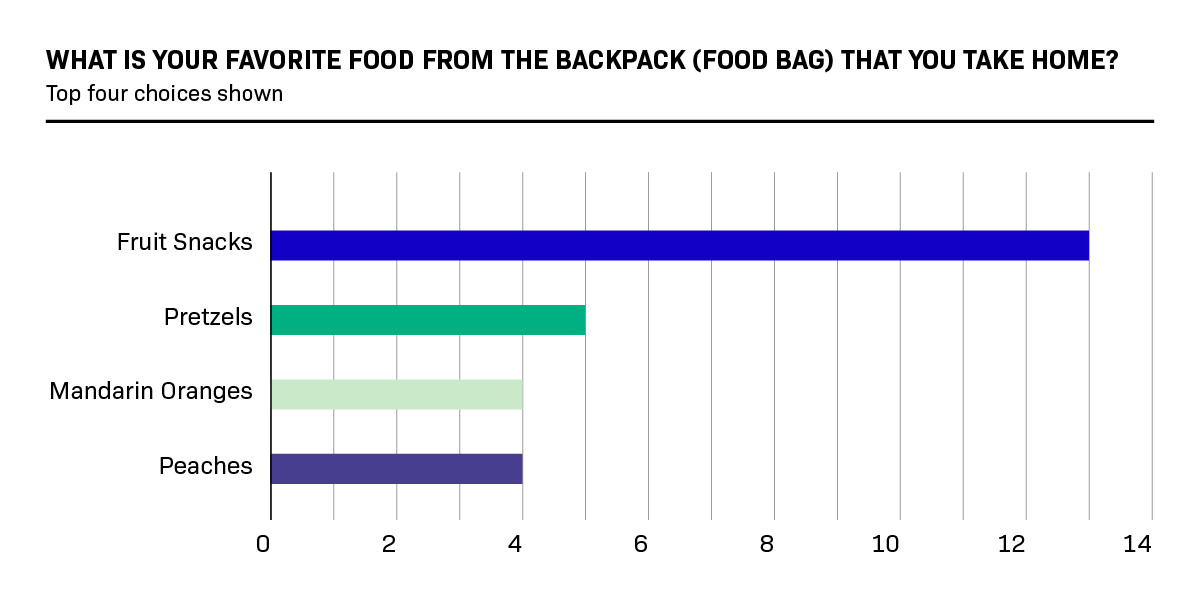
A Community United
As Mackenzie Andrews, Brent Hernandez, the Craigs and Huffmans have confirmed, this program enriches both the giver and the receiver by building a more compassionate community where everyone can thrive. By addressing the kids’ immediate needs, this collective also fosters a sense of unity and shared purpose that strengthens the whole.
When summer was looming on the calendar, the final backpacks for the school year included printed information cards for summer lunch programs and S-EBT cards, establishing continuous student support. Volunteering for the Backpack Program lays the groundwork for a healthier, more united region. “Austin is about giving back. Coming together to help the community is Austin’s motto,” Brent Hernandez says, encapsulating the spirit of this heartwarming initiative.

